Welcome! This is a blog about the changing landscape of online activism. We will discuss how it has helped past protests, how it has transformed present revolts and how it may alter future rebellions. All sorts of topics will be discussed from petition websites to hacktivist groups and even the impact social media had on revolutions such as the Arab springs.
Online Communities.
Check out the video on online communities.
https://www.youtube.com/watch?v=lJdcEK3ksvc
For those that prefer to read here is the Transcript of the Video.
Hi everyone my name is Haris Alexandrou and I am the author of this blog, the topic for this blog is going to be online communities and how they can impact the political landscape. From anonymous to the reddit community today we be a discussion of how each of the groups effect revolutions or protests and how much they affect the outcome, from memes to hacking how much does each method affect the protest. Starting on the lighter topic of memes, it is unbelievable how many memes go viral on social media sites such as Facebook or twitter. Memes by definition are an element of a culture or system of behavior passed from one individual to another by imitation or other non-genetic means, they are typically humors and often spread by internet users rapidly in the form of videos or images. They can have great social impact and have help voice the opinion of the general public especially in the 2016 American elections there were numerous memes for many of the candidates. Although some may not have been factually accurate many changed the way the American public perceived the candidates. Memes to summaries have the ability to be widely spread quickly or go viral and may change the opinions of a few people by many they are not taken seriously enough to change their opinions, further more they may only associate themselves with people who share the same opinions as them and therefore do not see the other side of the memes. So many people simply take the memes for what they sometimes convey witch is as jokes at or in relation to social or political change.
Jumping from one extreme to another but still on the topic of online communities anonymous is another online community, with many supporter and many haters anonymous is one of the most notorious internet communities. They are a hacktivist group that target any online source they deem harmful to society. Recently many ISIS terrorist recruiting twitter accounts have been the targets of the attacks compromising them with LGBT imagery. Some people see the group as online vigilantes and feel like they shouldn’t take the law into them on hands and that people should be entitled to their opinions no matter ho harmful to society, however no one can doubt that overall anonymous intentions are beneficial to society. On many occasions there have been massive support for the group after certain acts supporting groups that otherwise would have no support or recognition apart from the hacking of ISIS twitter accounts they have also been responsible supporting LGBT rights in Uganda supporting many of the protesters in the Arab spring protests and closing down of over 40 child pornography sites there is no doubt that anonymous are trying to help society. Starting on the site know as 4chan the group have even attempted to back the north Koreans into fighting their government in 2013 by taking down their national new website Uriminzokkiri. However, there are certain drawbacks when taking the law into your own hand and there have been some instances were the group have been wrong and people have been wrongly harassed online for a misunderstanding. Overall anonymous and other online communities have had a huge impact on social and cultural change. What are your opinions on online vigilantism good or bad? Discus in the comments below. And I hope you enjoyed and learnt something while listening.
Changing Traditional Protests
Today we will discuss the effect social media has had on traditional forms of protesting such as riots. Years ago it would have seemed impossible to organize a protest over the internet yet as time and social media sites have developed most of the organised protesting we see know days has been arranged prior via websites such as Twitter, during this blog post will discuss the impacts of sites like twitter on recent riots and protests. The internet has been universally credited with sparking revolution with anything from shopping routines to the fall of some governments. Today we will be discussing the impact it has had on protests like the Arab springs in 2011 and the riots that spread across England also in 2011. Has technology positively or negatively impacted protests and to what extent? Is what will try to be answered here today.

Some background about the Arab spring for those who do not know what it was about, it was a series of anti-government protests and armed riots that expanded across the Middle East in 2011. It started in Tunisia after unrest which eventually turned violent. The protests were successful across many countries causing fundamental change across many countries and toppling several governments including Tunisia’s Zine El-Abidine Ben Ali and Egypt’s Hosni Mubarak who was in power for 30 years. So how do the internet and online activities change the way the protests played out? Well the Arab Spring is often referred to as the Twitter revolution, as the social media platform played a key role in helping spread awareness about ongoing events all over the world, and, online revolutionary conversation often followed by a protest on the ground for both sides (pro/anti – government). it was also an important tool for governments as they could choose how to respond to the protests online reaching millions of people almost instantaneously. However, did social media play a role in creating the uprising or did it merely help organize them, many experts suggest that social media didn’t play an independent role in the protests and was merely a catalyst and it would have happened eventually with or without help from sites such as Twitter.
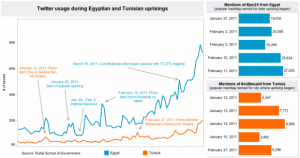
An argument against the use of social media in activism in general argued in Malcolm Gladwells article “Small Change” is that it leads to low risk activism similar to the argument of sliacktivism as discussed in a previous post, however slightly different what Gladwell agues is that it creates weak ties among participants meaning people only go along with an idea to gain a sense of belonging and participation even thought the cause is not that important to them, establishing a mob mentality protesting in a group for the mere reason of belonging to a group. Gladwell also argues that due to the fact social media is not hierarchically organised it complicates the decision-making process. However, taking into account these arguments in the case of Arab spring protests it is difficult to overlook the many positives that came as a result of them, consider your own opinion and voice them in the comments below. And for those interested in many of the statistics involving civil movements and social media sites like Facebook and Twitter I recommend reading the journal article Arab Social Media report of May 2011.
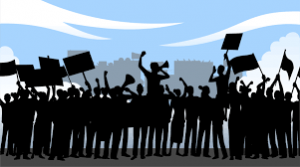
An example of how the power of social media can be used poorly is the England riots in August of 2011, originally protesting the death of Mark Duggan who was killed by the police it quickly escalated into arson, looting and needless violence. What started as a peaceful protested turned into a full scale riot with much of the blamed pointed to social media by helping the message spread and getting a bountiful crowd many who just showed up just to be part of the crowd or to committed crimes in the name of “Justice”. In addition to this there were a few Facebook pages glorifying the violence encouraging it further. The MET (London metropolitan police) also used twitter as a means of communication during the period warning people to stay inside in high risk areas, this connects the police with the public and although even through twitter the police remained in a controlled and distant position from the public, the presences of the police on twitter and getting real time reassurance and advice decreased the distance of the police to the citizens and may have prevented the protests getting worse with more causalities. Many people believe that social media and news coverage made the riots worse as watching other people loot at ill encouraged more people to join fuelling the chaos. It is not a question of weather social media aided the rioters organise it is how and could it be used for a better cause in addition to what could have been done to prevent it. Simply shutting down social networks would not have worked as it may have lead to more people joining the riots as they have something to protest know. Although the London riots were not a revolution it still shows the power social networking and the internet has when there is large group of people and is a good example of how it could organise people if there was to be revolution. Yet it also shows a few drawbacks of using public sites for example the police could also use it to dissuaded people from participating in addition to shutting down a few planned riots which happened people planned to crash the hackney carnival but police quickly shut the event down. Communication and social networking technology is constantly evolving and may benefit the police rather than the rioters as they have the power of the law behind them. however, although social media may have been voice of the protests as with the Arab Spring how much did It really impact the riots it may have simply been platform to voice the opinions of both sides rather than be the instigator or used to create the riots it may have been as with the Arab Spring a catalyst to the mayhem rather than the troublemaker. It is important to try to find the cause in situations like these rather than simply what correlates with it. Voice your own opinion in the comments bellow do you think social networking sites help or hinder revolutions or are they simply a powerful tool that can be used for good or bad?
Slacktivism.
This blog post we will be discussing slacktvism, what is it? Slacktivism, is the actions preformed via the internet in support of political or social causes, but regarded as requiring little time or effort. Although social media has made it easier to communicate, organize and otherwise prepare a protest, it has made people complacent with just appearing to support a cause, and has many people questioning weather the time and effort is worth it when you can just make a post. However, is a post as effective as a physical protest, for the most part no. Online protests dehumanise the cause detaching it form reality and the people involved making it easier for those who are being protest against to ignore the issue. For some people the only reason they may post about an issue is due social pressure, although individuals have may not researched and do not posses the knowledge to understand what they sharing, outside influences impact what they naively choose to support even thought it may not be showing both sides the arguments meaning there support for the protest is futile as they have desire to help any further for them clicking a button is enough. Similar to a mob mentality, often a complex idea is posted online without both sides of the argument as it is difficult to summarise many of the issue and still keep the attention of the audience, often it is so condensed that even with someone sharing or tweeting the post it is still not beneficial as people don’t fully understand the subject and are too lazy to do their own research. People prefer to share a 5 minute video summarising half the points of a topic and expect it to make a difference, that is slacktavism.

For those that remember Kony 2012 it was a great example of slacktivism how a vastly complex problem was simplified, although there was a good reason for the cause it nothing actually changed even thought there were millions of supporters sharing and posing about it. Awareness of an issue is only part of a solution although around 100 million people have see the video made by the charity Invisible Children, knowledge of a situation is not the answer, it is a step in the right direction. Yet by clicking like sharing or putting up posters it doesn’t actually effect the situation. Often and in the case of Joseph Kony the Ugandan military leader online protests are just ignored. The kony 2012 video captured the ethos of a stereotypical slacktavist, and as put by Aljazeera’s, Sarah Kendzior “Viewers oblivious to complex foreign conflict are made heroic by watching a video, buying a bracelet, hanging a poster. “Sarah continues with stating that viewer’s emotional response and desire to catch joseph kony was sincere buying a bracelet didn’t actually help. Furthermore, it may be argued that videos like Kony 2012 distract us from the real issues and the causes of the issues, this may be due to oversimplification of the issue misleading people by not showing the true cause meaning people can never know what to do that will stop and prevent another Kony 2012. Although slacktivism is often used in a negative term it can sometimes and often does help even the slightest bit of awareness can lead to more donations for a charity. A great example of so called slacktivism helping a great deal for a cause is the ALS ice bucked challenge that went viral in 2015.
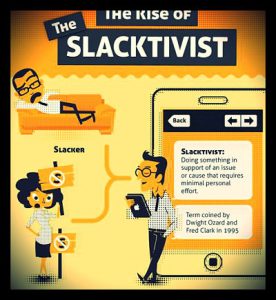
For those of you living under a rock with no idea what the ice bucket challenge was people literally pouring icy water over their heads all in the name of ALS or Amyotrophic lateral sclerosis a motor neuron disease. Through the almost gamification of the trend by calling out friends or family to also take part the ice bucket challenge had huge impact in raising money towards the cure for ALS, and it raised more than £7 million. This is the other side of the argument of slacktivism it can achieve great thing through awareness even if it is not understood properly understood. So what is your opinion of slacktivism? Is posting your outrage or support true activism or is activism taking action like the saying, actions speak louder than words. What cannot be argued though is how it can benefit some causes through donation like the ALS foundation. So is it easier to protest as people can communicate and spread messages faster or has it made people lazy, by only spreading awareness not actually affecting the issue?
Furthermore, through internet outrage people often form communities were people support one another and witch may eventually lead to some form of action taking place. We will be discussing a related topic on the next blog how the internet effects real life protests like the Arab springs or the London riots.
WikiLeaks.
For this blog the topic we will be talking about is WikiLeaks, and by extent Edward Snowden. Whistleblowing by definition is when a person exposes any kind of information or activity that is deemed illegal, unethical, or not correct within an organisation. two of the most famous of whistle blowers in recent times have been Edward Snowden, a former NSA (National Security Agency) employee who disclosed to the public that the NSA was effectively spying on the publics private affairs phone calls, messages etc.… The second is Julian Assange an Australian computer programmer publisher and journalist, he created the website know as WikiLeaks. WikiLeaks a non-profit media organisation whose aim is to create a “free press” were all government documents harmful or otherwise should be available for viewing by the public. Of course both of them would not have had a voice would it not be for Facebook or twitter as governments often control newspapers, in a way by sharing the information that they have they are protesting against the government censorship only made possible through sites such as Facebook, Twitter or sites such as WikiLeaks.
So how much has the internet and the ease of spreading communication, affected whistleblowing and government transparency? As Julien Assange characterises in a series of essays he wrote, many first world governments are “secrecy-based, authoritarian conspiracy governments’’. What WikiLeaks is attempting to accomplish is a secrecy free government, and an entirely free media, independent from government bodies. As of right now national newspapers in the UK are still regulated by IPSO (Independent Press Standards Organization) who works closely with the government meaning the press is not entirely free as it is not allowed to self regulate. However, can the press be trusted to self-regulate and provide objectives news should it be free from any governing bodies. No, no they cannot be trusted as evidenced by the news of the world scandal in 2011, it had been revealed that they had been hacking mobile phones eventually causing them to close, for those that want to read more check out this article by the BBC, http://www.bbc.co.uk/news/uk-11195407. So if government controlled news cannot be trusted to be objective and free-news cannot be trusted to be ethical what is the solution?
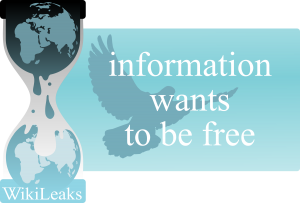
Are sites like WikiLeaks the solution? For me It’s a step in the right direction, of course this depends on your point of view on the issue, should the government show the public everything or should they keep secrets just like the rest of us. This blog will attempt to show you both sides for you to make your own mind up. On one side should the government should the UK government disclose all of its information to the public that would also mean it is out there for criminals or terrorists to see, implying that it would be easier for those outside of the law to work around it knowing the governments countermeasures. However, on the flipside if the general population new what the government was doing to prevent terrorist acts it would put their minds at ease or they could even potentially think of improvement and help the government. Following will be a list of some of the pros and cons of whistleblowing or WikiLeaks so you can make up your own mind regarding this topic.
So the advantages of WikiLeaks are, it could benefit public safety as it may show information on possible terrorist attack locations, some people may also view sharing information as a moral responsibility. Furthermore, it allows the public to view the truth on controversial topics such as wars in the middle east, showing them unbiased news for free should they look for it, additionally it shows corruption and allows for internet freedom witch people have a right too.
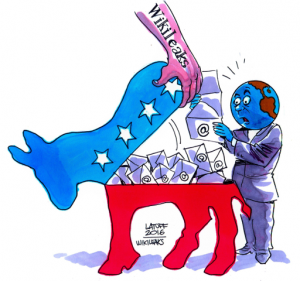
Some possible disadvantage of WikiLeaks may include countries secrets are exposed witch could cause damage as they are able to be seen by anyone, it may cause tension with other countries or allows terrorist organisations to view and abuse, information such as police regulations. In addition, the information is often illegally obtained and organisations such as WikiLeaks may be accused of helping terrorists. Finally, the information leaked may be leaked in order to help an agenda, recently during the presidential elections in the USA Russia has been accused of leaking documents of Hilary Clinton indirectly aiding trumps victory. These are the main points regarding WikiLeaks and whistleblowing please feel free to discuss your own opinions in the comments below.
Online Petitions.
The first post will discuss online petition websites like change.org or petition.parliament.uk, both these examples along with many more are great examples of how many people want change. But how useful are they? Petitions do allow people to have a voice bring the important issues into the peripheral view of the government. This does allow for some level of communication between the governing bodies and the general population which is essential in a democracy. However just because it can be heard by the government, do they listen? Out of around 24,500 petitions on, petition.parliament.uk, only 0.18% or 45 of the topics have ever been debated in parliament. Not great, although the government regularly responds to petitions with over 10,000 signatures they are simply explaining their position rather than listening to the people. For the few people who simply didn’t understand why the legislation was implemented, an explanation is all that is needed. Yet for so many other who simply disagree with the original legislation and the governments explanation nothing happens, for those people it is difficult not to see petition.parliament.uk as simply a scam to the public tricking them into thinking their voices matter and when you look at how much their signatures truly counts it looks pretty glum. On the bright sight though a petition can often cause a spark, followed by the angry voices of the mob banging on parliaments windows, metaphorically of course. Way back in 2010 the British government planned to sell publicly owned forests in England this was met with public outrage. 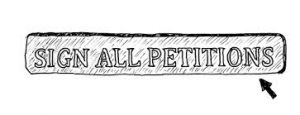
A petition of around 500,000 signatures made the government rethink their position and ended up founding the Independent Panel on Forestry (IPF) whose aim is to increase and protect England’s woodland, all this was inspired by an online petition so +1 for democracy and +1 for online “activism”. There have been a few more examples of successful petitions in Britain although many didn’t hold the same weight as woodland petition it is still important to note that sometimes petitions can help change government decisions for the better. And sometimes for the worse as on the 18th of October 2015 parliament needed to debate a petition that received over 100,000 signature asking for an end to all immigration into the U.K which is simply a ridiculous idea nonetheless it was debated and fortunately found to be a foolish idea.
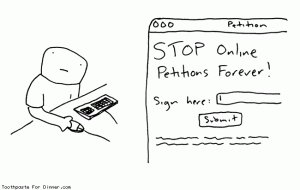
Feel free to voice your opinion in the comments below. Keep an eye out on Facebook and Twitter for our next post about WikiLeaks.